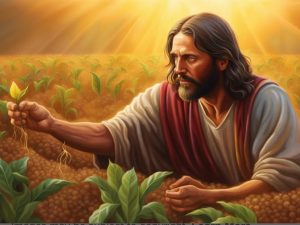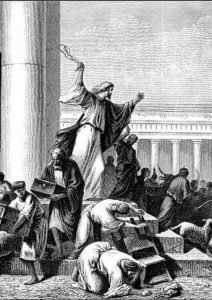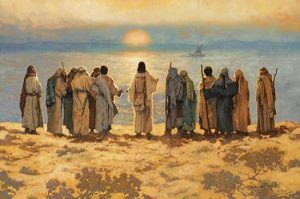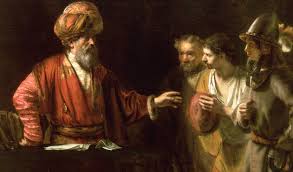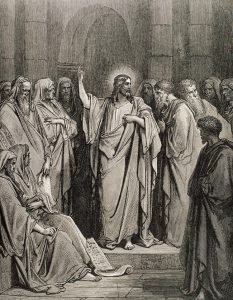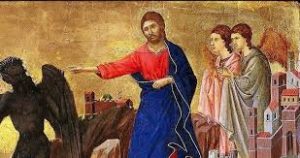Today is the day we remember all fathers. I give honor and respect to those fathers who render sacrifices to guide and to raise their children with love. May God bless you and your family always.
Today’s liturgical calendar is the 11th Sunday in Ordinary Time, Year B. I have observed that the color green has become prominent in my surroundings. Seeds are starting to sprout, and flowering plants are beginning to bloom. Everything adds joy to everyone and to our Mother Earth, but we cannot avoid the unfortunate consequence to our physical condition. The high count of pollen in the atmosphere from oak trees and other plants cause severe irritation in the eyes and clogged and sneezy noses. I personally have that summer sickness. I must accept that summer permits us to stay outdoors; however, we need to be extra careful.
In our Sunday readings today, we hear beautiful allusions from the many significant events in the history of Israel and from Jesus’ parables.
The first reading is taken from the book of the Prophet Ezekiel. To understand the original meaning of this scriptural text, there are many symbolisms we need to familiarize ourselves with, for example, “All that the trees of the field shall know that I, the Lord bring low the high tree and lift high the lowly tree, wither up the green tree and make the withered tree bloom.” What we hear signifies Israel’s defeat, and so she needs to have a return and be replanted back in Jerusalem. It is also to announce the coming time when God (messianic prophecy) is going to bring back Israel, a promise where God is going to make valleys raised, and mountains made low. The lowly tress will branch above the lofty which will wither and be brought low. “It shall put forth branches and bear fruit,” which signifies those who are faithful and loyal kings who will form the new kingdom. “Birds of every kind shall dwell beneath it,” refers to its pristine and innocence as in the book of Genesis after the flood.
The 2nd reading from the second letter of St. Paul to the Corinthians reminds us that we have courage “for we walk by faith, not by sight.” It means that our faith makes us persevere in walking with confidence. The word “confidere” in Latin means to believe. We know that we believe and trust God in the midst of difficult challenges and that it is hard to imagine how we could dare to have hope. We might be tempted to lose courage, but our faith dictates that it’s not the way we think of having the power to be victorious. Rather, we need God alone, believing that He alone can redeem, and besides that, the Lord knows more than we understand.
The gospel consists of two parables:
In the 1st parable a farmer is scattering seeds on the land. The seeds grow and bear fruits even without human intervention. The farmer can harvest its fruits with God’s grace, which moves mysteriously in ways that we cannot understand. We plant seeds, maybe with little effort to cultivate them, but we believe that God is in control and not us. In the same manner, the kingdom of God continues to grow mysteriously, for God is the real builder and we just cooperate with Him. Therefore, we are called to place ourselves in God’s loving hands and not to be so trusting with our own human capability. If we are truly committed to living out the gospel values in our lives, then, even though we might not see the results immediately, it is possible that we have no idea of how we are witnessing God’s work in us and influencing others by our fidelity and trust in God.
The Kingdom of God grows within every person precisely because in human interiority, we seek and find God according to St. Augustine. Though it cannot be attained in human intellectual pursuits, we search God in the heart. It has established quietly in our interior life where the heart is attracted to Divine Goodness. It grows when we humbly commit ourselves in prayer and enables us to fertilize our hearts with His Words and Sacraments.
The 2nd parable is about the kingdom of God as compared to a mustard seed. Though the smallest of seeds, it springs up to become the largest of plants. It describes to us the humble beginning of the kingdom of God which is likened to a mustard seed. A mustard seed is the tiniest of all seeds which grows into the largest shrub and gives shade to the birds.
The kingdom of God parable is identified by the good fruits we produce through the acts of faith, hope and charity. This is precisely what the early Christians did. They had terrible experiences of frustrations, desolations, and weak faith, but they cling to Jesus, our Lord, and to each other. And they slowly grow with much dependence in God who called them. We too might be frustrated and even discouraged by continued deterioration of peoples’ trust in the Church, violence, hatred, and intolerance, but we cannot easily give up.
I believe that God will make everything the way He wants it to be. Now, I place my trust in Him, believing that He alone can heal our spiritual interior struggles with His love, mercy, and grace. Lord, please give us courage to sustain this faith and to witness it for others who need it from You and me. Then, we ask You to make our hearts fertile with good soil, so that love would bring more life and growth, not only for me, but for others and the whole Church.
God bless you.
Fr. Arlon, osa
Message to the Parishioners
Dear Beloved Brothers and Sisters,
It’s summer!!! I notice that there is not much spring here in Carson City. It seems that the season went right from winter to summer with no spring in between. We can’t see the back yard because of so many growing plants and trees with branches covered with green leaves. It is just like the parable about the farmer sowing seeds and the next morning having big plants and not noticing the overwhelming growth right before his eyes.
In the same manner, our dear children have grown so fast. Time flies so fast that it’s hard to imagine that they already have graduated from Pre-K, Elementary, Senior High, or this year have successfully done their college studies. To all the graduates of 2024, thank you for your patience, diligence, and perseverance to reach a milestone of your success. Congratulations to all, especially to the graduates of St. Teresa of Avila Catholic School.
To the parents and guardians who have journeyed with your children in their search for knowledge, guiding them and supporting their education, your sacrifices are not forgotten. We thank you.
To our Principal Peggy, teachers and staff, your tremendous hard work inspires the whole parish with your dedication and exemplary contribution to our students. You have planted the seed and given the time to teach our students to yield fruits. Hats off to everyone!
How good it is to thank and honor God, and the goodness of every parishioner is like a bountiful harvest, upright and fruitful and rooted in God. The kingdom of God parable is identified by the good fruits we produce through the acts of faith, hope and charily. This is precisely what contributed to the success of the lives of those early Christians.
I have witnessed this reality, being with you for almost ten months in the parish of St. Teresa of Avila, I won’t forget how amazing everyone blossomed and grew in faith where I was happy ministering for a while in a forest loving and praising community. I want to remain with you, in your loving hearts, whispering a blessing for all. I have gained many friends, whom I cherish in my heart and certainly those memorable experiences together, especially celebrating daily and weekend masses and sharing gospel reflections are a few of the things to remember. They become the very source and strength of true friendships. As an Augustinian Missionary, building friendship is our charism of life. I am happy to have many friends here. Thank you for being a part of your faith-community and your faith journey. St. Thomas Cathedral is just 25 minutes away! See you there.
Friends in Christ, when frustrations, desolations, and weak faith come, always call on Jesus and cling to Him. Then, we can slowly recover from those things and grow with much dependence in God because He loves us. In spiritual life, it is normal to feel emptiness, dryness, and discouragement by continued deterioration of trust in the Church, hatred, and intolerance, but please don’t easily give up. God works in mysterious ways.
I believe that God will make everything the way He wants it to be. Now, we place our trust in Him, believing that He alone can heal our spiritual interior struggles with His love, mercy, and grace. Lord, please give us courage to sustain this faith and to witness it for others who need it from You and me. Then, we ask the good Lord to make our hearts fertile with good soil, so that love will bring more life and growth, not only for us, but for others and the whole Church.
God bless you.
Fr. Arlon, osa
—————————
El Dictado del Corazón
Onceavo Domingo del Tiempo Ordinario, año B
- Ezequiel 17:22-24
- Salmo 92:2-3, 13-14, 15-16
- 2 Corintios 5:6-10
- Marcos 4:26-34
Hoy Celebramos a todos los padres, mi respeto y admiración a aquellos padres que se sacrifican por educar, guiar, enseñar valores y por formar a sus hijos con amor y entrega total. Que Dios los bendiga junto a sus familias hoy y siempre.
El calendario litúrgico de hoy es el Onceavo Domingo del Tiempo Ordinario, Año B. He observado que los colores verdes en mi entorno se vuelven prominentes, las semillas comienzan a brotar y las plantas con flores comienzan a florecer, todo agrega alegría a todos y a nuestra Madre Tierra. Pero no podemos evitar la desafortunada consecuencia de nuestra condición física. El alto contenido de polen en la atmósfera procedente de robles y otras plantas provoca irritación grave en los ojos y nariz tapada y estornudos. Tengo náuseas de verano. Debo aceptar que el verano nos permite estar al aire libre, pero hay que tener mucho cuidado.
En nuestras lecturas de hoy, escuchamos hermosas alusiones a muchos eventos importantes en la historia de Israel y a las parábolas de Jesús.
La primera lectura está tomada del libro del profeta Ezequiel. Para comprender el significado original de este texto de las Escrituras, debemos familiarizarnos con muchos de los simbolismos, por ejemplo, “Todos los árboles del campo sabrán que yo, el Señor, bajo el árbol alto y levanto el árbol humilde”. , seca el árbol verde y haz florecer el árbol seco”. Lo que escuchamos significa la derrota de Israel, por lo que necesita regresar y ser replantado en Jerusalén. También es para anunciar el tiempo venidero en el que Dios traerá de regreso a Israel, una promesa en la que Dios elevará los valles y bajará las montañas. Los árboles humildes se ramificarán sobre los altos, quienes se marchitarán y caerán. “Producirá ramas y dará fruto”, lo que significa aquellos que son reyes fieles y leales que formarán el nuevo reino. “Debajo de él habitarán toda especie de aves”, se refiere a su inocencia prístina como en el libro del Génesis después del diluvio.
La segunda lectura de la segunda carta de San Pablo a los Corintios nos recuerda que tenemos valor “porque por fe caminamos, no por vista”. Significa que nuestra fe nos hace perseverar en caminar con confianza. La palabra “confianza” en latín significa creer. Sabemos que creemos y confiamos en Dios en medio de desafíos difíciles y es difícil imaginar cómo podríamos atrevernos a tener esperanza. Podríamos sentirnos tentados a perder el coraje. Pero nuestra fe dicta que no es la forma en que pensamos en tener el poder para ser victoriosos, sino que necesitamos solo a Dios, creyendo que solo Él puede redimir. Y además, el Señor sabe más de lo que entendemos.
El evangelio consta de dos parábolas:
La primera parábola trata de un granjero que esparce semillas en la tierra. Las semillas crecen y dan frutos incluso sin intervención humana. El agricultor puede cosechar sus frutos con la gracia de Dios que se mueve misteriosamente en formas que no podemos entender. Plantamos semillas, tal vez con poco esfuerzo para cultivarlas, pero creemos que Dios tiene el control y no nosotros. De la misma manera, el reino de Dios continúa creciendo misteriosamente porque Dios es el verdadero constructor y nosotros simplemente cooperamos con Él. Por eso, estamos llamados a ponernos en las manos amorosas de Dios y a no confiar tanto en nuestra capacidad humana. Si estamos verdaderamente comprometidos a vivir los valores del Evangelio en nuestras vidas, entonces, aunque no veamos los resultados, es posible que no tengamos idea de cómo estamos testificando e influyendo en otros a través de nuestra fidelidad y confianza en Dios.
El Reino de Dios crece en cada persona precisamente porque en la interioridad humana buscamos y encontramos a Dios según san Agustín. Aunque no se puede lograr en las actividades intelectuales humanas, buscamos a Dios en el corazón. Se ha establecido silenciosamente, en nuestra vida interior, donde el corazón es atraído por la Bondad Divina. Crece cuando nos comprometemos humildemente a la oración y nos permitimos fertilizar nuestro corazón con Sus Palabra y Sacramentos.
La segunda parábola trata sobre el reino de Dios en comparación con una semilla de mostaza, que aunque la más pequeña de las semillas brota hasta convertirse en la más grande de las plantas y da sombra a los pájaros. Nos describe el reino de Dios.
La parábola del reino de Dios se identifica por los buenos frutos que producimos mediante el acto de fe, esperanza y caridad. Esto es precisamente lo que hicieron los primeros cristianos. Tuvieron terribles experiencias de frustraciones, desolaciones y fe débil pero se aferran a Jesús, nuestro Señor. Y poco a poco crecen con mucha dependencia de Dios que los llamó. Nosotros también podemos sentirnos frustrados e incluso desanimados por el continuo deterioro de la confianza de la gente en la Iglesia, la violencia, el odio y la intolerancia, pero no podemos rendirnos fácilmente.
Dios hará todo como Él quiere que sea. Ahora pongo mi confianza en Él, creyendo que sólo Él puede redimir este desastre con Su amor, misericordia y gracia. Señor, por favor danos el coraje para sostener esta fe y ser testigos de ella para otros que la necesitan de ti y de mí. Luego, te pedimos que hagas que nuestros corazones sean fértiles con buena tierra, para que el amor traiga más vida y crecimiento, no sólo para mí sino para los demás y para toda la Iglesia.
Dios los bendiga.
P. Arlón, osa
